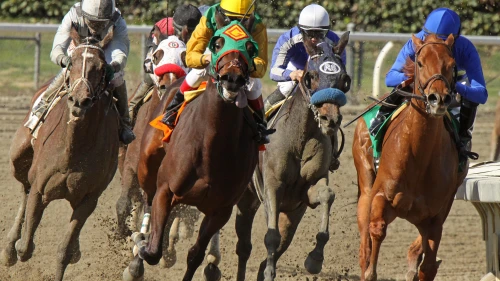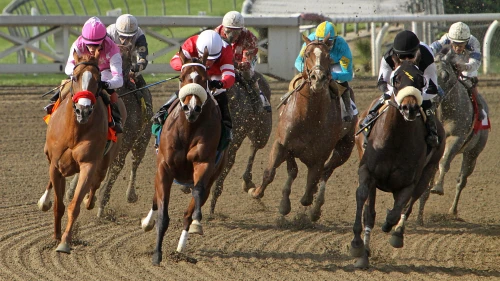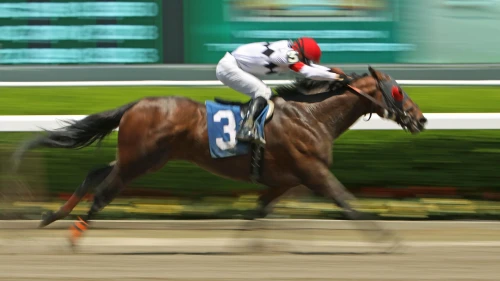
Horse Racing stats man, Andy has contributed to OLBG for 18 years - An Ipswich fan and F1 fanatic, he also contributes EFL football and Motor Sport opinion.
There is a case recently where a punter placed a large number of multiple bets covering a range of horse in certain races and won a large amount of money.
You can read more about multiple bet options in our understanding bookmakers article.
She is currently fighting her bookmaker through the courts because they have refused to pay out.

It would seem that this is an extreme case of a punter taking advantage of “bad each way” bets and has provoked a debate about the each way system in horse racing.
When we bet on a horse in a betting shop or with a traditional bookmaker online, we traditionally have two choices.
We can either simply bet on the horse to win, or we can bet on it each way.
An each way bet is effectively two bets, one for the horse to win and one for it to place.
The place bet is won if the horse finishes in the first 2, 3 or 4 places (depending on the number of winners in the race) and usually pays out ¼ or 1/5 of the odds offered on the win part of the bet.
Lots of people like an each way bet, especially if betting on a horse that is offered at long odds, because it means that if the horse just misses out on winning then there is still some reward.
This is not the only way of covering the possibility that your horse might come second, third (or sometimes fourth or even fifth).
On a betting exchange or on the Tote it is possible to have a place only bet. This bet is very much like the place half of an each way bet.
Many people will have a win bet and a place bet on the tote for example and will think that this is the same as an each-way bet.
In terms of the chances of winning, it is exactly the same, but in terms of pay-out it can be quite different.
The reason for this is that each part of the bet has a different price that is set independently.
The each way system assumes that there is a relationship between the likelihood of a horse winning and the likelihood of it placing, but this isn't always the case.
Each Way Betting Example
The big race of the day when this blog was started was the July Cup at Newmarket, with a field of ten, an each way bet paid out a quarter of the odds for three places (which is pretty typical).
The table below shows the prices available on the OLBG tipping competition (being the best bookmaker prices available on each horse) and the Betfair win and place prices.
There are markets for 2 and 4 places on Betfair as well as an each way market, but the 3 places market is equivalent to the place part of the each way bet and is what most used on Betfair and is most similar to the place bet with the Tote), so this seemed the most appropriate market to use.
|
|
OLBG | BF | BF Place | OLBG Win p/o | BF Win p/o | OLBG Place p/o | BF Place P/o |
|---|---|---|---|---|---|---|---|
| Caravaggio | 2.1 | 2.16 | 1.26 | 2.1 | 2.10 | 1.28 | 1.25 |
| Limato | 5.5 | 5.6 | 1.77 | 5.5 | 5.37 | 2.13 | 1.73 |
| Harry Angel | 7 | 7.2 | 1.99 | 7 | 6.89 | 2.5 | 1.9405 |
| Tasleet | 9 | 9.6 | 2.4 | 9 | 9.17 | 3 | 2.33 |
| The Tin Man | 10 | 11 | 2.4 | 10 | 10.5 | 3.25 | 2.33 |
| Brando | 34 | 44 | 6.4 | 34 | 41.85 | 9.25 | 6.13 |
| Growl | 101 | 170 | 17.5 | 101 | 161.55 | 26 | 16.68 |
| Mr Lupton | 101 | 120 | 15.5 | 101 | 114.05 | 26 | 14.78 |
| Intelligence Cross | 151 | 340 | 29 | 151 | 323.05 | 38.5 | 27.6 |
| Intisaab | 151 | 410 | 30 | 151 | 389.55 | 38.5 | 28.55 |
The table above shows the prices in the first three columns and then the return on the win in columns four and five from a one-unit bet.
For OLBG this is exactly the same as the price, for Betfair it is slightly less because of the commission charged on profits (5% is assumed to be the level, bigger punters will pay less).
The last two columns show the place pay-out for each if we assume that one unit is being staked on that bet or part of a bet (so in the case of an each way bet this is the place win if a unit is placed each way i.e. two units in all).
For the favourite, both win and place pay-outs are very similar whether using the OLBG price or the Betfair price.
As we move down the table though we see that on Betfair the price of the outsiders is much bigger than it is for the OLBG price, which we mustn't forget is the best price available from a range of bookmakers.

With the place pay-out though, we see the opposite; a bettor who had an each bet on one of the outsiders with a bookmaker would make a much bigger return on the place part of his bet than he would with a place bet on an exchange.
Remember that in the pricing for an each way bet we are assuming that the ratio of the chance of a horse winning to the chance of that horse placing is constant (so to get the price for the place part we simply divide by a single number for all the horses in a race).
The reason for patterns that can be seen in the above table is that this assumption does not hold.
Punters may think that this gives them a good way to get one over on the bookies, but they would probably be wrong.
Firstly, don't forget that the prices on the exchange for a win bet were much better for the outsiders on Betfair than with the bookies.
The reason for this at least in part has to be that the bookies know this price is also used to set the each-way price and are making the price lower than they would otherwise do.
So if you back a big priced winner with a bookmaker, the current each way rules are costing you, not the bookmakers.
If you are someone who likes to take advantage of “bad” each way prices (usually for outsiders in races where there is a strong favourite), then the rules are in your favour, but this will not make you a valued customer with your bookmaker.
For obvious reasons, bookmakers often reserve the right to restrict or close their customer's accounts.
Where this happens because a punter is consistently backing bad each-way horses, then there is surely an argument that this is quite fair.
The point of betting is to find winners, punters who have lots of bad each way bets, often in multiples and often on multiple horses in the same race, fly in the face of this.
The bookmakers understandably don't like it, and if you are the type of punter who enjoys picking a winner and getting paid a good price for it, then neither should you.
At the moment there are rules that bookmakers have to set each way prices in the way described.
It would be easy to change this rule so that they could set a win and a place price independently.
The sooner this happens the sooner the game will be fairer for all involved.



